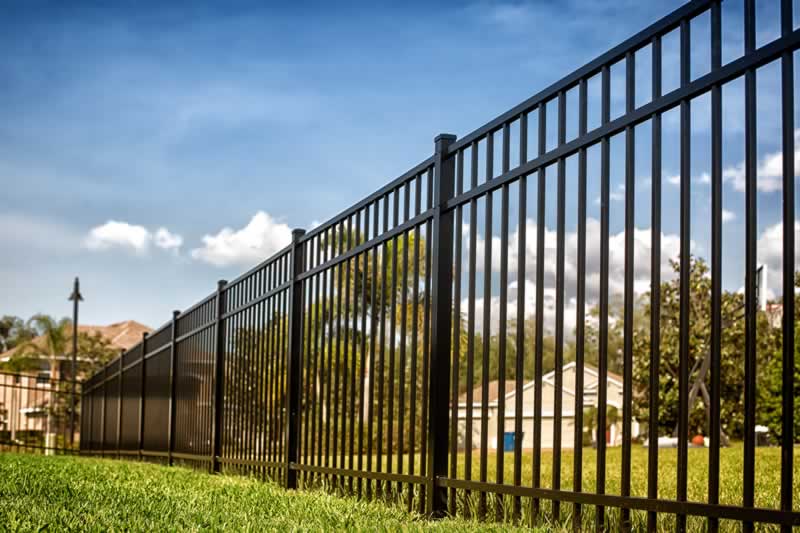Choosing a fence for your home is more than just aesthetics. Sure, looks and curb appeal are big factors. However, choosing the right fence material will determine cost, longevity, and durability. And a fence material suitable for one homeowner might not be ideal for another. Beyond material, there is also applied. For example, looking to keep deer out? Buy deer fencing. Looking to keep your yard free of geese? You should buy goose fence and kits like these https://www.critterfence.com/goose-fence.

With that said, this article would discuss the most common types of fencing material. By understanding the different fencing materials and their unique pros and cons, you can choose the right one for your property.
1. Wood Fence
Perhaps the most popular fencing option, wood fences are the classic home fences, providing design versatility and options. You can find low-profile wood picket fences to privacy fences that completely block off your yard from prying eyes. Unfortunately, they require serious maintenance or they’ll swell, warp, or splinter. Also, they have a shorter lifespan than other fence types.
2. Vinyl Fence
A better alternative to wood, vinyl fences offer you the look of wood without the serious maintenance requirement. It’s strong and durable and comes in various styles and designs. They’re also easy to assemble, with some vinyl fencing systems available in pieces that can be snapped together. However, vinyl isn’t moisture-resistant and can result in mold, algae, and mildew growth, leaving stains on your fence. Also, while it doesn’t swell or splinter like wood, extreme weather can cause cracks and turn the fence brittle. Check this out if you need more help deciding between wood and vinyl.
3. Metal Fence
Metal is also a popular material for fencing. And you have three common options for metal fencing:
- Steel
Steel is one of the oldest fencing materials available used for centuries. Steel fences are durable and offer good longevity. In fact, a steel fence is meant to last a lifetime. And with the right conditions, it can look as good as new for a very long time. Rust can be a concern, but most steel fences are covered in rust-proof powder to prevent this issue. Steel fences are expensive and lack design versatility. Also, you shouldn’t install a steel fence on your own due to its weight.
- Wrought Iron
Like steel, wrought iron fences are known for being both long-lasting and beautiful. In fact, it’s a common choice for ornamental fencing, offering a safe and durable enclosure for your home but still having a good amount of visibility. It’s been a popular fence material for over two centuries and can maintain its integrity for decades. Aside from being durable, wrought iron is also hard to break, making it a great option for security purposes. However, its durability doesn’t come cheap. Plus, it also needs a good amount of maintenance in order to prevent rusting.
- Aluminum
Similar in appearance to wrought iron and steel but more affordable and lightweight, aluminum is a great option if you’re on a budget. Plus, it’s a recyclable material, which is suitable for eco-conscious homeowners. Aluminum fences are relatively maintenance-free. The only maintenance you need is when you paint or decorate it. With proper coating, it can stand up to outdoor elements such as snow and rain. However, the lightweight structure may not be ideal if you’re looking for something sturdier. Also, take note that aluminum fences are prone to bending.

4. PVC Fence
Similar to vinyl fences, PVC fencing is the cheapest fencing material you’ll find. PVC is a great option for security and privacy. It also requires little to no maintenance. Although it’s not as durable and sturdy as wood or vinyl, it can certainly hold up to the general wear and tear and strong weather conditions. Like vinyl, though, it’s prone to mildew, algae, and mold build-up.
Similar to PVC fences are grass fences which are made with artificial grass in a frame and they provide the look of natural fence.
5. Stone Fence
If you’re looking for a fence that’ll last incredibly long, then stone is the best way to go. Stone fences have a rustic appeal and are the best in terms of durability. Plus, you can also find a range of natural colors. Durability doesn’t compromise cost since stone fences are cheaper than metal fences. However, installation can be costly and difficult. Also, depending on the climate condition in your area, you might have to face some mildew or cracks. However, it should affect the overall integrity of your fence.
Conclusion
Whether this is your first time shopping for a fence or replacing one, understanding the different fencing materials can help you choose the right one. Contact us for your fence installation projects. Hopefully, this would provide you with the needed information in order for you to make the most cost-effective and smartest decision for your home. Consider the ideas mentioned here as you pick materials.







My daughter has been wanting to add a fence around a historic home that she purchased last month. With the final sale going through just recently, she’s been thinking about what kind of fence will look best with the traditional home. Thank you for explaining that wrought iron has been a popular fence material for over two centuries because it makes me think that this could be a really good option to fit with the style of her home.